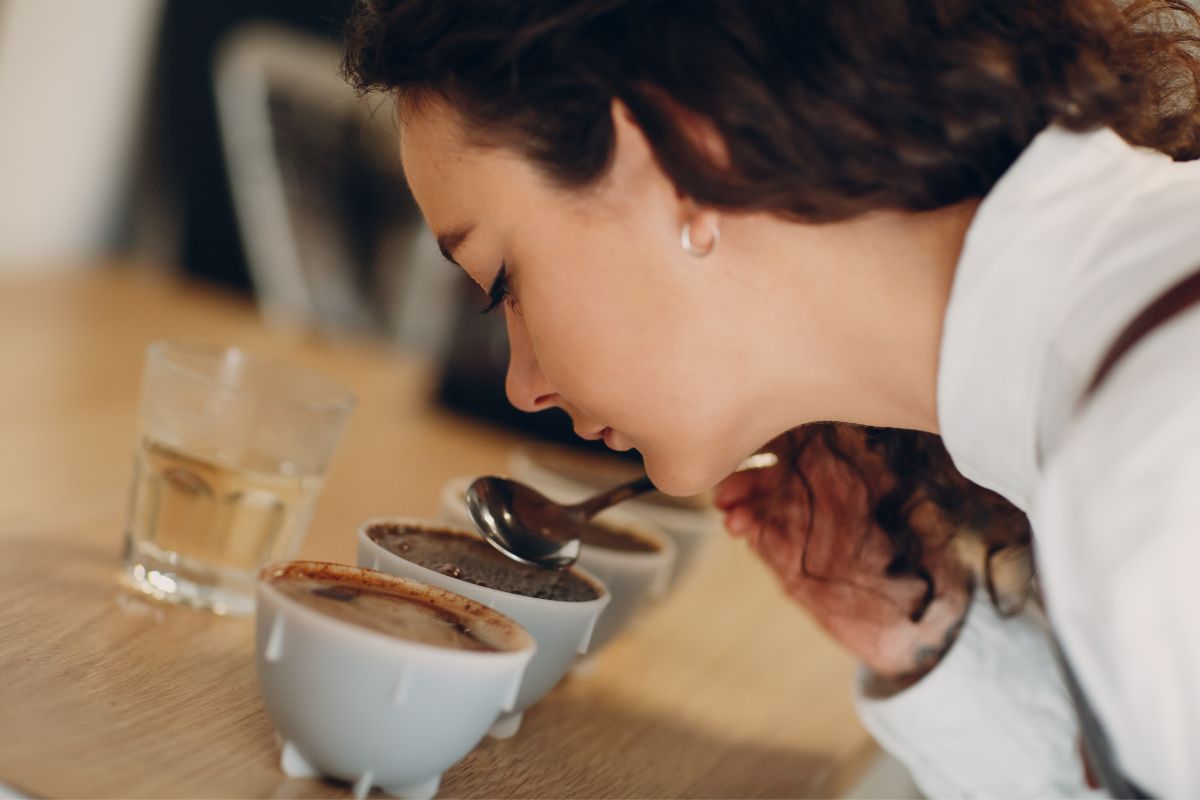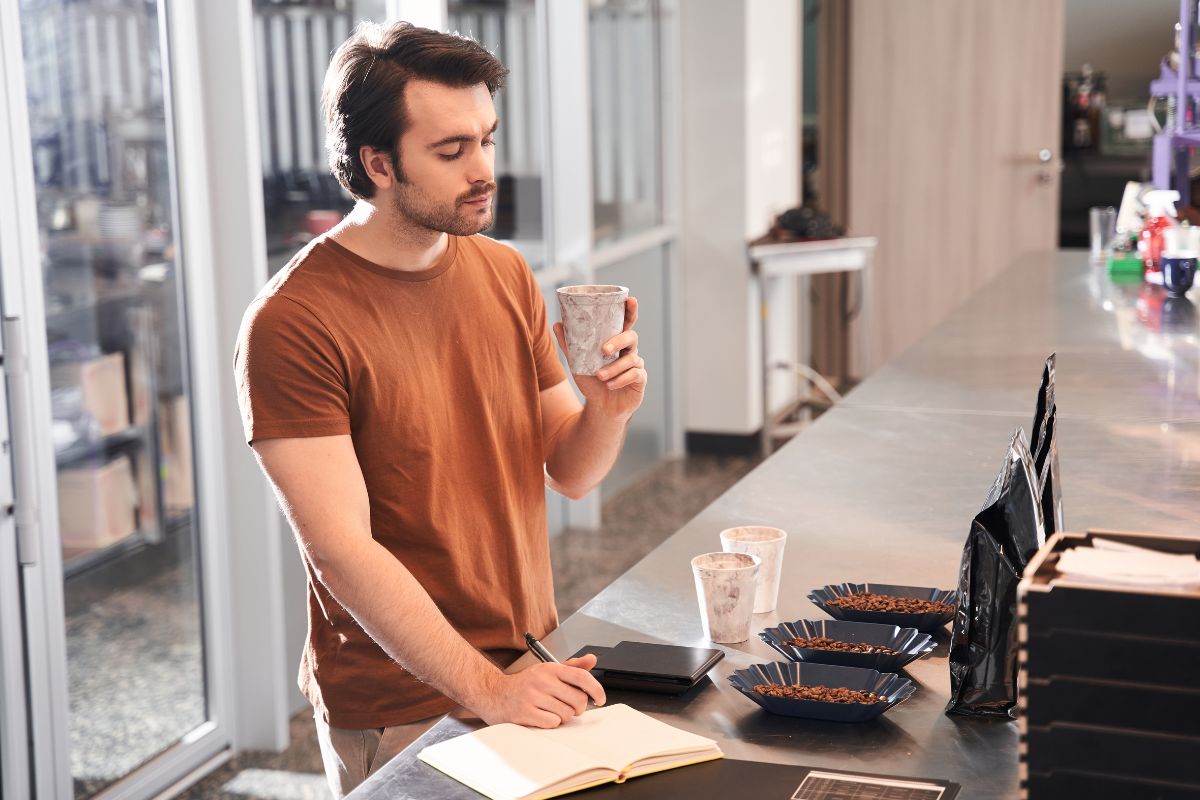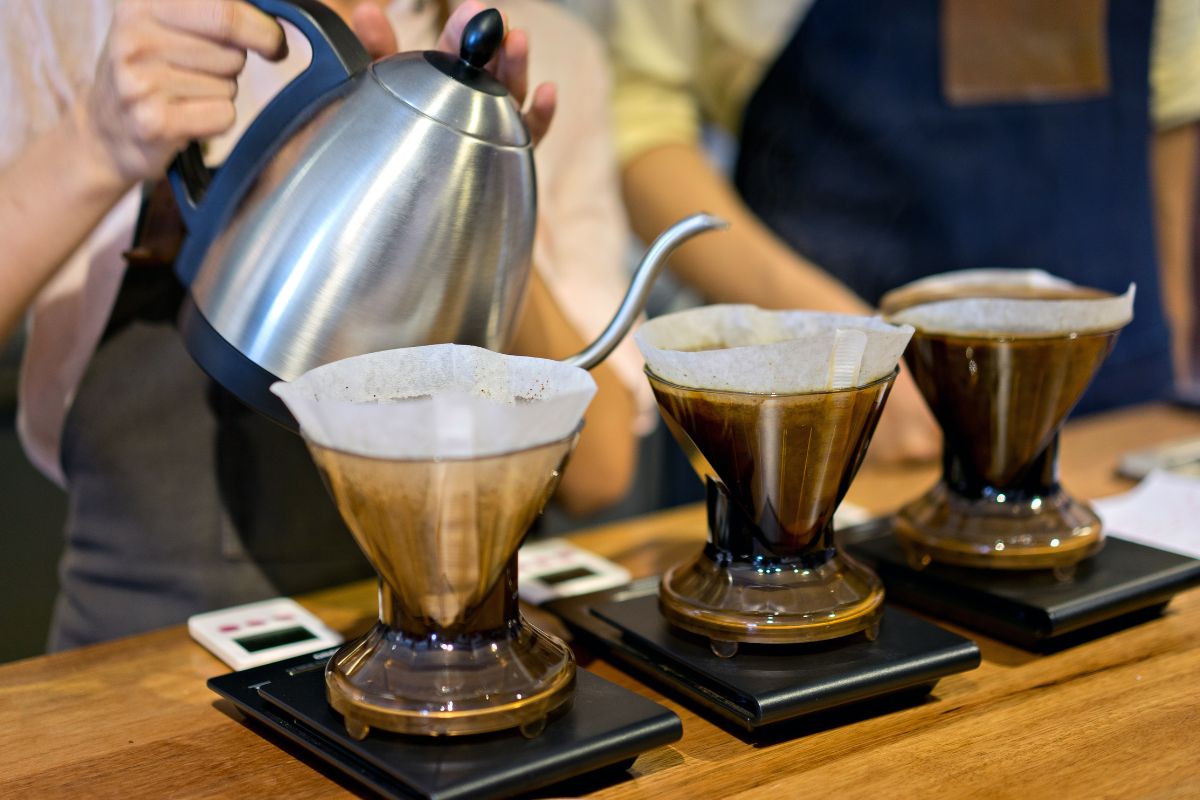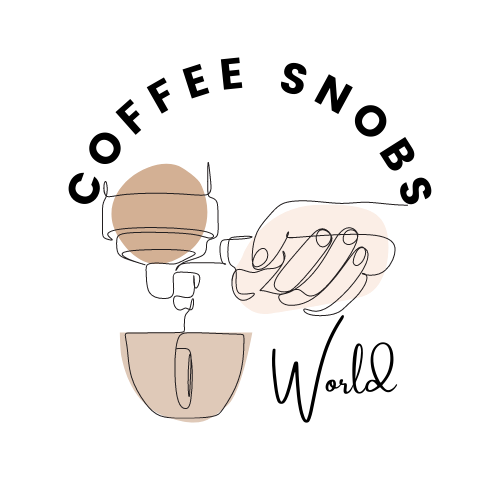Decaf coffee seems to be on the tip of everyone’s tongue today. But does decaf coffee taste different on it? And does switching to decaf mean giving up the favorite aroma in the name of health?
The answer may surprise you, but everything depends on the person. Chances are that upon reading this article, one will look differently at decaf coffee or even decide to compare it with regular coffee. One way or another, one will definitely treat their morning coffee differently.
Now that intrigue has settled, let’s look at decaf and how to enjoy it.

The Taste of Decaf Coffee
The taste of decaffeinated coffee has been a subject of fiery discussion between coffee lovers. When asked, “What does decaf coffee taste like?” some people find the flavor less strong, bland, and even sour. Others do not see the difference at all.
Decaf coffee may taste more sour and bland because of the decaffeination process that dries up the coffee bean, leaving a bitter aroma.
Does Decaf Coffee Taste Different Than Regular Coffee?
In short, no. Decaf coffee has little to no difference in taste compared to regular coffee.
Both amateur coffee drinkers and connoisseurs find it difficult to distinguish between regular and decaf coffee. Sometimes, they may discover decaf coffee better than a cup of standard espresso or filter. Read our article and find out Is Decaf Coffee a Diuretic?
At some point, if one has two cups of coffee – regular and decaf – there is a chance of biased perception. Let’s say a person is skeptical towards decaf coffee, so they will find a difference in any detail. In other words, it is a very individual thing.
One will find it difficult to distinguish between regular and decaf coffee.
On the other hand, decaf coffee has this slight sourness. The reason for it is in the processing of coffee beans. Decaf coffee is a little sourer but can also seem more bitter. But once again, it does not cross outside the pleasant aroma.
This is good news for people with caffeine addiction or medical contraindications. Decaf coffee can taste quite good. After all, it depends on the label, just like with regular coffee.
At the same time, a trained eye can tell the difference between regular coffee beans and decaf ones. Decaffeination washes off around 97% or even more of the caffeine in the beans, so they are usually drier and lighter.
The visual difference also depends on the type of decaffeination. For example, in Swiss Water – one of the most popular decaffeination processes- beans are a few shades darker than regular roasted beans.
Overall, there are many nuances that one can see only if one knows what to look for. But for an average coffee drinker, the difference is minimal.
Why Does Decaf Coffee Taste Different? The most obvious reason decaf coffee may taste differently is the decaffeination process.
Today, there are four main decaffeination processes – Swiss water, direct-solvent process, indirect-solvent process, and carbon dioxide process.
There is also organic decaffeination, which involves chemicals from natural sources.
All these variations can slightly alter the taste of coffee. Some people argue the taste is there, while others deny flavors whatsoever.
Decaffeination may steal some flavor and make the final product taste bitter or sour. But if it works for someone, it is not really a disadvantage.
For example, some coffee enthusiasts notice the fruity and sweet aroma of Swiss Water decaf. It seems as if Swiss Water is the most preferable among connoisseurs.
Does Decaf Coffee Contain Caffeine?
Still, even if it seems that decaffeination absorbs all the caffeine from the beans, even chemicals are not strong enough to get rid of 100% caffeine.
A typical cup of coffee contains around up to 0.0005 fl oz (2 to 15 mg) of caffeine. When comparing this amount to a cup of regular coffee with no less than 0.0032 to 0.0067 fl oz (95 to 200 mg) of caffeine, that amount seems like nothing.
First, the amount of caffeine leftover in beans depends on the decaffeination method. Second, it depends on the time a cup of coffee gets to the consumer.
Interestingly, the FDA did not clarify the maximum amount of caffeine for any brand to have the “decaf” label. The only rule states that “decaffeinated” applies to those brands that remove at least 97% of the caffeine in their beans.
As it turns out, with the FDA having no specific guidelines, the only authoritative body one can refer to is the brands themselves. So, next time one chooses between two decaf options, the one more known may be better. After all, big brands value their reputation.

Does Decaf Give You Energy?
The very point of drinking coffee is to get energy from the caffeine. So many people are meticulously brewing their morning cup of coffee uniquely.
Coffee drinking has become such a big part of people’s lives that it is no wonder one tends to forget the impact caffeine has on the body. Caffeine addiction soon becomes real, forcing die-hard coffee drinkers to turn to safer options without breaking the morning ritual.
Decaf coffee is a great alternative to regular coffee, especially for those with high caffeine tolerance. When the usual cup of coffee does not do the trick anymore, the portion increases, and so does the tolerance limit.
Eventually, it is not the energy one seeks but the sensation of coffee taste, the very ritual that starts the day (and for someone even finishes).
However, people who are naturally sensitive to caffeine (a genetic feature) can get energy even from decaf coffee.
Once again, the human response to external substances is incredibly unique. So, where one decaf espresso can please the taste buds of one customer, it can also charge another for a productive morning.
Is Decaf Coffee Better for You?
The question of whether or not decaf coffee is better for a certain individual depends on several factors, as one could notice in the previous section.
Most people choose coffee to improve their focus and memory, treat headaches or migraine, and even increase athletic performance. Although energy drinks seem to work better for athletes. One way or another, caffeine is common for both drinks.
In some medical cases, caffeine is necessary to maintain health. For example, people suffering from low blood pressure, asthma, ADHD, depression, and other conditions need a certain amount of caffeine to maintain a normal lifestyle.
However, suppose the reader has no similar issues and wants to try decaf for whatever reason. In that case, it can have positive health outcomes.
There is definitely no person on the planet that has not had at least some addiction to coffee. Unless one knows their limit, too much caffeine can be bad for health.
Just as a treatment for headaches and respiratory issues, excessive caffeine can cause them. Not only that, drinking too much coffee can lead to insomnia, irritability, and urinary problems.
To make sure one does not endanger themselves, trying decaf coffee is a good prevention of health problems.
As for people who control their caffeine intake, switching to decaf will not change much. A slight energy loss may happen, but nothing too severe.
What is the Point of Drinking Decaf Brews?
At this stage, the reader can get confused about the point of drinking decaf coffee. The previous section has explained the main goals of those who switch to decaf.
First is the health reason. Even moderate coffee drinkers (2 to 3 cups a day) are at increased risk of a heart attack. So turning to decaf coffee seems like a good decision, especially in a hectic life like today.
Anxiety is also a big bad culprit that feeds off caffeine. Consuming 200+ mg (0.0067+ fl oz) of caffeine daily increases the risk of anxiety, panic attacks, and even phobic symptoms. Switching to decaf coffee will not solve the problem in people with chronic conditions but will surely ease the symptoms.
Good sleep is one more thing people today wish to have. Caffeine can mess with the sleep-wake cycle, making it difficult to fall asleep and have a restorative sleep because of caffeine residue in the bloodstream.
Changing regular coffee to decaf can help restore the sleep-wake cycle back to more natural. It’s better than going cold turkey and suffering when awake.
Another reason is taste, of course. After all, some find decaf coffee to taste milder and more delicate. Decaf seems to fit the palette of those people who don’t share a love for regular bitter coffee.
To sum up, decaf coffee has all the benefits of regular coffee. It can work better for those who prefer a milder taste of coffee. At the same time, it has more health benefits than regular coffee and is more suitable for a chaotic lifestyle.
The Decaf Coffee Process Explained
The sourness or even bitterness of decaf coffee comes from its unique preparation.
First, coffee beans go through decaffeination, which does not have one universal tradition. Notably, the beans must stay unroasted, basically green, to avoid losing flavors during decaffeination.
There are four main ways to process coffee beans, specifically for decaf.
- Swiss Water Process
Swiss Water Process must be the most popular decaffeinating procedure out there. Interestingly enough, the procedure itself takes place in British Columbia, Canada.
Putting coffee beans into clean water and carbon filters removes 99.9% of caffeine, being the most organic and chemical-free of all procedures.
In some cases, Swiss Water decaf coffee may be more expensive, but people seem ready to pay for it. It is slightly acidic on the tongue as well.
- Direct-Solvent Process
The second way to get rid of caffeine in beans is Direct-Solvent Process. There, coffee beans go into a chemical solution that removes most caffeine. Before immersion, coffee beans steam for around thirty minutes to open up.
Then, they go through the shower of ethyl acetate or methylene chloride for ten hours. These solutions wash away most caffeine.
However, one should not worry about finding chemical residue in their decaf coffee because beans go through an intense roast (400+ degrees F, or 204℃) and brewing (200 degrees F, or 93℃) process, which breaks any potentially harmful chemicals.
- Indirect-Solvent Process
The Indirect-Solvent Process seems a little less hazardous than the previous one. The process starts with soaking coffee beans in hot water to release the caffeine.
The next step is to transfer the water bank with caffeine molecules (but without beans) into the solvent. The latter absorbs the caffeine particles and leaves all flavor molecules and oils in the water.
After the solvent cleans the water of caffeine, it returns to the beans, allowing them to reabsorb all the flavors.
- Carbon Dioxide Process (CO2 method)
This is the most recent method of decaffeination that uses carbon dioxide as a solvent.
Like the previous methods, beans soak in water and then go through the caffeine extraction process by liquid CO2.
During the procedure, a stainless steel container with beans fills with liquid CO2 under 1,000 pressure per square inch (0.645 pressure per square meter). The solvent separates caffeine particles from the rest of the beans’ elements, like flavor molecules.
CO2 then moves to another container, releasing the caffeine and returning to a gaseous state.
The Carbon Dioxide Process seems to be one of the safest and may gain more popularity in the future.
What Makes Decaf Different?
Basically, to summarize all mentioned earlier: the biggest distinction between decaf coffee is the lack (or almost lack) of caffeine.
This property provides all of the health benefits of decaf coffee and makes its taste special – at least for some people.
Decaf is more “user-friendly” than regular coffee by not giving jitters on the first gulp or hitting the taste buds with a bitter aftertaste.
At the same time, decaf coffee is different within itself, too. The reader must remember four distinct decaffeination processes. Usually, the brands mention them on their packaging (e.g., chemical-free, solvent-free, Swiss-water, or certified organic).
People care about what they drink, so while regular coffee lovers measure the caffeine level, decaf drinkers try to guess the number of chemicals in their cups.
It is absolutely normal to be skeptical when it comes to one’s health. But giving decaf a shot – in all meanings -is worth time and money. Learning how to find the one is a great journey in itself.

We’ve Got You Covered
To sum up all the things, decaf coffee is a more versatile thing. The minimum of caffeine in this coffee has numerous benefits for those who seek better health or try to put some control over their habits.
Shifting to decaf coffee may take some time for a person to enjoy it. Although its taste does not differ much from regular coffee, the customer always has the final word. So if one finds their new cup of decaf a bit unusual, not giving up would be an achievement.
More than taste, the health benefits of decaf coffee show one’s determination to have a more conscious approach to nutrition and wellbeing.
Overall, switching to decaf is a serious change, so giving oneself time to adjust and educate is important. Hopefully, this article was of use and encouraged the shift.

